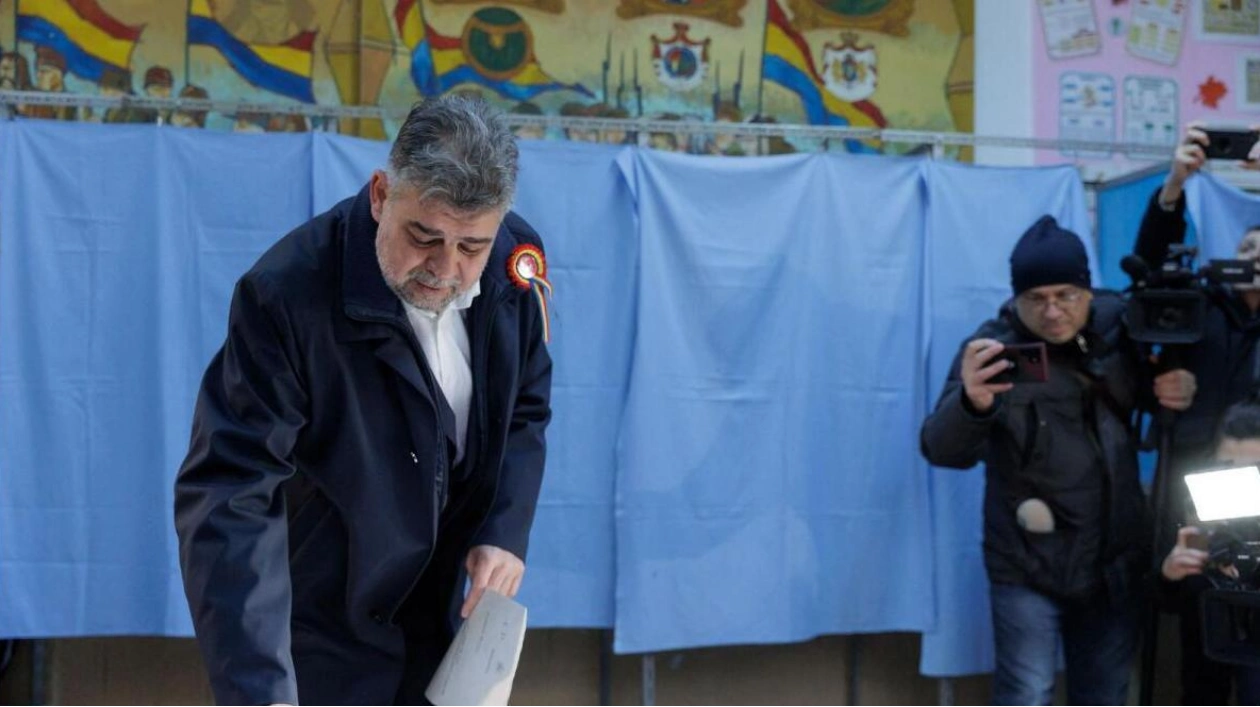Romanian Prime Minister and ex-leader of Romania's leftist Social Democrat Party (PSD) Marcel Ciolacu casts his vote during the parliamentary election in Buzau, Romania, on Sunday. REUTERS
Romanians headed to the polls on Sunday to elect a new parliament, with the far right expected to triumph, potentially signaling a shift in the foreign policy of the NATO member state bordering Ukraine. The parliamentary election occurs amid political unrest, triggered when a high court ordered a recount of the first round of the separate presidential election held on November 24. The presidential ballot was secured by Calin Georgescu, a relatively unknown far-right supporter of Russian President Vladimir Putin. A run-off for that election is scheduled for December 8.
Despite allegations of Russian influence and purported interference via TikTok, Sunday's parliamentary elections proceeded as planned. Polling stations opened at 7am (0500 GMT) and will close at 9:00 pm, with an exit poll set to be released shortly afterward. The first official results are anticipated later in the evening.
Florentina Noja, a 55-year-old engineer, stated she voted for 'some young' candidates whom she believed were 'a little less indoctrinated by the current system'. 'We need to try to start afresh,' she told AFP in Bucharest. She also expressed hope for 'more transparency and less corruption', while voicing concern that Romania might deviate from its pro-European trajectory.
Romania's political scene has been dominated by two major parties over the past three decades. However, analysts foresee a fragmented parliament emerging from Sunday's vote, impacting the prospects of forming a future government. Polls indicate that several far-right parties—opposed to sending aid to Ukraine—are projected to garner a combined vote share of over 30 percent.
The nation of 19 million people has thus far withstood rising nationalism in the region. Yet, experts argue it now confronts an unprecedented scenario since the fall of Communism in 1989, as frustrations over soaring inflation and fears of being drawn into Russia's war in neighboring Ukraine intensify.
George Sorin, a 45-year-old economist in Bucharest, told AFP he hoped the far right would perform well. He contended that the outgoing parliament primarily served Ukraine's interests by providing aid and prioritized the European Union over 'national interests'. The far-right parties comprise the AUR, leading in the latest polls and whose leader, George Simion, secured nearly 14 percent of the presidential vote. Additionally, there is the extreme-right SOS Romania party headed by the fiery Diana Sosoaca, and the newly established Party of Young People (POT), which could surpass the five-percent threshold to enter parliament.
In the opposing pro-EU camp, the centrist USR aims to perform well after their leader Elena Lasconi placed second in the presidential ballot. The ruling Social Democrats (PSD) and the National Liberal Party (PNL) faced a significant setback in last week's presidential election. Outgoing Prime Minister Marcel Ciolacu remarked after voting that Sunday's parliamentary ballot was a choice 'between stability and chaos'. Outgoing pro-EU President Klaus Iohannis emphasized that the vote was 'crucial' and would shape Romania's future—whether it will 'remain a country of freedom and openness or descend into toxic isolation and a dark past'.
The parliamentary election unfolds at a sensitive juncture, with the top court's directive to recount the ballots of the first round of last week's presidential election causing widespread disarray. After casting his vote in the city of Foscani, AUR leader Simion accused some individuals of 'trying to repeat the (presidential) election to achieve the outcome they desire'. 'Last Sunday, the Romanian people spoke,' he asserted, insisting the result of the presidential vote should be upheld. According to Septimius Parvu of the Expert Forum think-tank, the recount order by Romania's Constitutional Court had 'many negative effects', including eroding confidence in Romanian institutions. 'We've already recounted votes in Romania in the past but not millions of votes, with parliamentary elections in the middle of it all,' said Parvu. The top court's decision is likely to bolster the far right, he added.
'No decision made during this crucial period should limit the right of Romanians to vote freely nor further jeopardize the credibility of the election process,' the US embassy in Romania stated.
Source link: https://www.khaleejtimes.com






